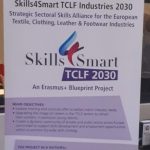Digital competences in the EU textile, clothing, leather and footwear (TCLF) industries
Professor Eugenija Strazdiene of Fashion Design Department at Vilniaus kolegija / University of Applied Sciences has attended the EURATEX (the European Apparel and Textile Confederation) conference on the 8th of February 2019, which was organized at the Centre of Business and Science 14 in Brussels. During the conference the results of two projects: Digital TCLF Industries (http://digitaltclf.eu/) and Skills4Smart TCLF Industries 2030 (http://www.s4tclfblueprint.eu) were presented. With the rapid expansion of Industry 4.0 European companies for textile, clothing, leather and footwear (TCLF – Textile, Clothing, Leather, Footwear) started to face the urgent need for new digital competences of their manufacturing professionals.
During the implementation of Digital TCLF Industries project, 47 vocational training organizations were interviewed in 12 European countries. Also, in-depth interviews were organized in their manufacturing companies. Nine professions were defined as needing digital competences alongside innovative technical/engineering skills. It was emphasized that fashion and clothing industries need training on the most advanced CAD/CAM software focusing on processes virtualization. There is also a need for complex knowledge of the new generation of materials and their processing properties. Particular attention should be given to digital skills in the supply chain and product trends management.
The aim of the second project – Skills4Smart TCLF Industries 2030, is to strengthen the modernization and competitiveness of the EU textile, clothing, leather and footwear (TCLF) sectors by developing a sustainable upskilling and reskilling strategy and involving all stakeholders – social, economic and political partners. In Lithuania the same trends of the manufacturing sector development are observed as all around the EU: the decline in the demand for low-skilled workers and the increase in the average age of workers. The conference emphasized that the only way for the European TCLF sector to remain competitive worldwide is the production of innovative high value-added products, which must be implemented through maximum digitalisation of product development and production processes, even addressing such new labour relations challenges as human/machine interactions. The results and recommendations of these two EU projects are of great importance for the perfection of Fashion Technology and Business studies program at Vilniaus kolegija/University of Applied Sciences, thus contributing to the competitiveness of the Lithuanian clothing and textile companies.




